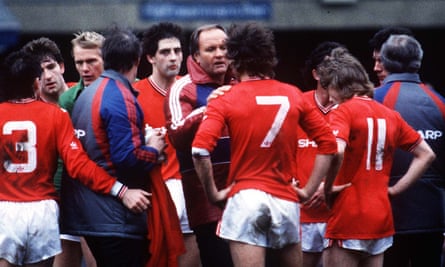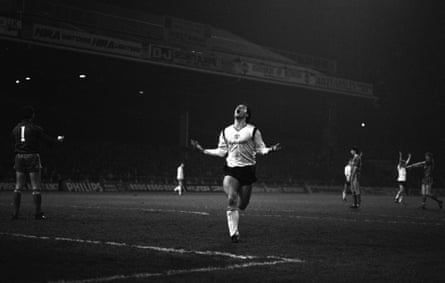When Manchester United beat Liverpool on the way to FA Cup glory
Bryan Robson earned the nickname Captain Marvel by putting his body on the line for club and country in the 1980s. He inspired those around him and dragged every inch out of his ability for Manchester United and England. “I have been fortunate to work with some exceptionally gifted footballers, many of them magical, world-class talents,” said Ron Atkinson in Andy Mitten’s book We’re The Famous Man United. “But Robbo, without a doubt, is the finest, the greatest, the most rounded and accomplished footballer I have ever worked with.”
After managing Robson at West Brom, Atkinson brought him to Old Trafford for a British club record fee of £1.5m in 1981. By the start of the 1982-83 season, the midfielder had been promoted to the United captaincy.
Robson was the perfect team player, as he showed in his first season as skipper. He scored twice in the FA Cup final replay against Brighton but, such was his team ethic, he turned down the opportunity to score a hat-trick in United’s triumph, rejecting Arnold Muhren’s offer to score from the penalty spot. Team before self was always Robson’s approach, sometimes to the detriment of his fitness.
The 1982-83 season provided a neat summary of United under Atkinson: they reached the League Cup final and won the FA Cup but they finished third in the league, 12 points behind Liverpool (and one behind Watford). A fantastic cup side who could raise themselves for the big games, United could not quite crack the league.

They were often hamstrung by injuries to key players, as Arthur Albiston admits in Mitten’s book. “We had good enough players. We proved that with the results we got against the top sides like Liverpool, but we weren’t consistent against your Coventrys. Not winning the league for so long started to weigh heavily on the players, too. That and relying on Bryan Robson. The players sensed that if he was injured, we would struggle. And, unfortunately, Robbo was often injured.”
Toppling Liverpool from their perch in the league would prove too much for Atkinson, but United supporters could take solace from their results against their biggest rivals. Liverpool only beat United twice in the league in the 1980s. Of course, Liverpool had the consolation of winning numerous league titles, two European Cups, and beating United in the League Cup final in 1983 – when Robson was injured.
When the teams were drawn together in the FA Cup in 1985, Atkinson was spot on when he noted: “This semi-final could not be harder for either side.” The Liverpool manager Joe Fagan agreed, saying: “It has the makings of a classic. It’s going to be a high-tension game and the atmosphere will be electric. The winners will be the ones who keep their nerve.” With Everton marching towards the league title, both clubs were desperate for success in the FA Cup. There was no need to hype up this occasion.
Fortunately, the FA decided against moving the match to Wembley, fearing the semi-final would overshadow the showpiece final. It proved a wise decision. Although violence was a constant feature in both matches – the initial 2–2 draw at Goodison Park and the replay four days later at Maine Road – the atmosphere in both matches was off the scale.
Robson opened the scoring at Goodison Park, only to see Ronnie Whelan’s fantastic late strike take the match to extra time. Frank Stapleton restored United’s lead, but a controversial late equaliser from Paul Walsh forced a replay at Maine Road. For neutrals, it was a welcome sequel.
United fans must have worried that they had blown their best chance. Having been behind twice in the game, Fagan admitted that Liverpool were fortunate to gain a second chance at Maine Road.

When Paul McGrath headed into his own net in the 39th minute of the replay, Atkinson’s men must have feared the worst. But Robson would not go down without a fight. Just 75 seconds into the second half, he collected the ball in the centre-circle, played a one-two with Stapleton and started bearing down on the Liverpool defence. He strode across the halfway line and flicked the ball past a bemused Alan Hansen. Within the blink of an eye, a welcoming gap had opened up.
Ronnie Whelan and Mark Lawrenson were giving chase and, perhaps wary he would not reach Bruce Grobbelaar’s goal, Robson drew back his left foot some 25 yards from goal. “He’s on his way,” said Brian Moore in commentary. “Can he find the shot?” Yes was the emphatic answer to Moore’s question. Grobbelaar got hands to the shot but the power was too much. “Brilliant goal,” Moore screamed. “Bryan Robson makes a superb equaliser for Manchester United.” By the dugout, a determined Atkinson clinched his fists in delight.

“It was a superb piece of individual play by the England captain,” wrote David Lacey in the Guardian. Robson considered the goal his best for Manchester United, saying: “You can do that 25 times on the training pitch and you will miss 24 times, but it was the one time when it went right for me.”
Not for the first time, Robson had driven his team on and given them the belief that the match was there for the taking. Mark Hughes struck the winner in the 58th minute and United were going to Wembley. As the final whistle sounded, jubilant United fans flooded on to the pitch of their city rivals and lifted Robson on their shoulders. It made a change for him to be carried for once. “I wasn’t too worried,” he said after being swamped by supporters. “The fans were just happy although one or two of them were fairly excited.”
There would be more celebrations on 18 May, when 10-man United beat Everton 1-0 in the final. Norman Whiteside’s winner at Wembley is rightly celebrated, but it would not have been possible without Robson’s stunning strike at Maine Road. Robson scored equalisers in three FA Cup semi-finals for Manchester United – in 1983, 1985 and 1990 – and he went on to lift the trophy at Wembley in all three of those seasons. Cometh the hour, cometh the Captain Marvel.